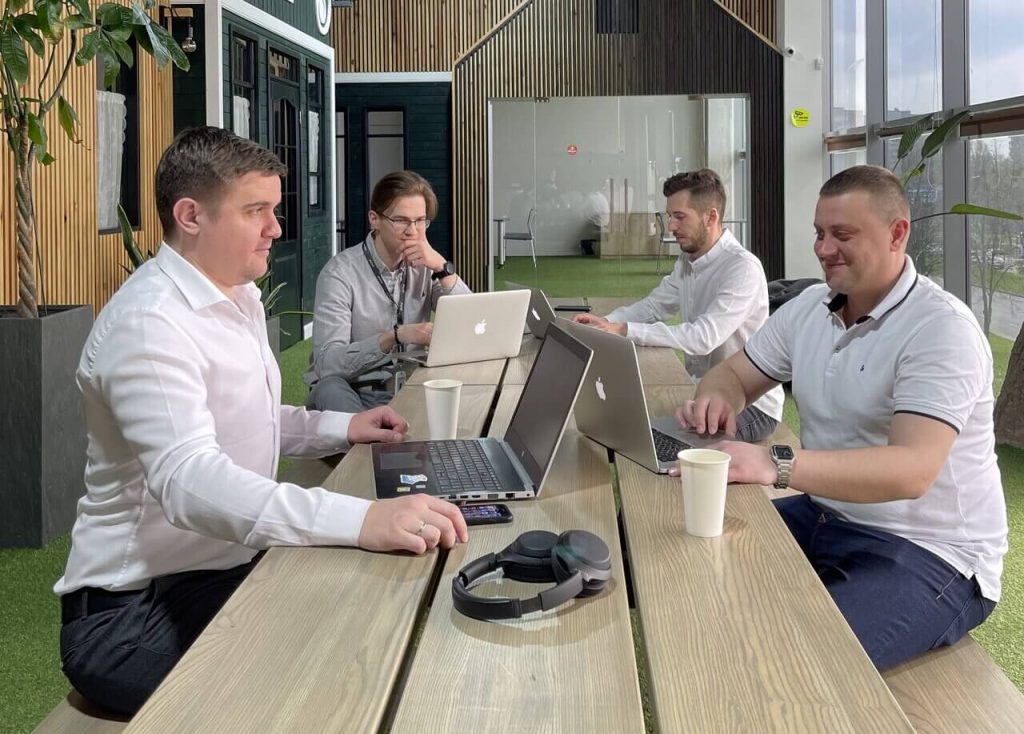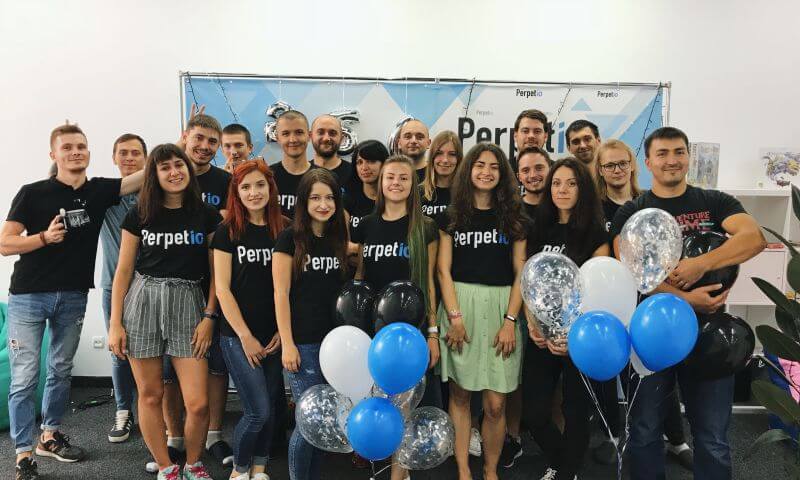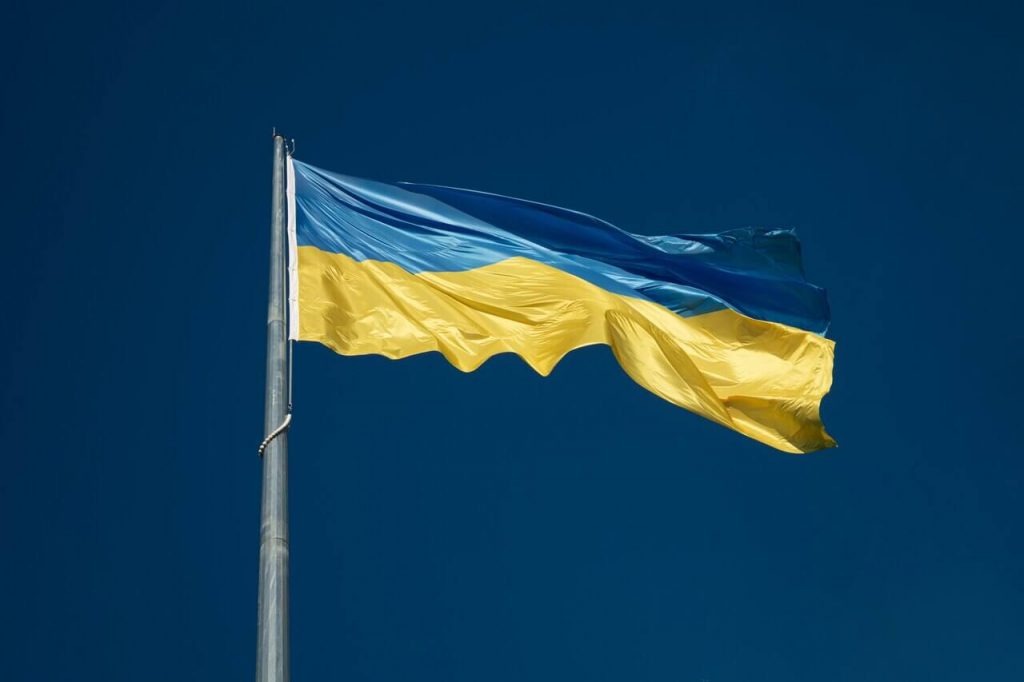keeping business afloat amid war
How eight Ukrainian e-residents have maintained their businesses in Estonia with the support of e-Residency

No Ukrainian business has been unaffected by the war. As of March, according to a survey by the European Business Association, almost 27% of companies had suspended operations. And only 17% were considered fully operational. The war has dealt a massive blow on all possible fronts, including economically.
But after the first wave of shock, business is gradually returning to work. And entrepreneurs are adapting to new realities. Of course, there are companies that have changed their direction of activity, some have stopped their activities indefinitely. And there are those who managed to hold out despite difficult conditions and uncertainty. Many have moved their offices to safer cities, regions, and even other countries.
Many companies have been able to retain their staff and clients thanks to their status as e-residents of Estonia. Here are the stories of 8 of them, from IT-service firms and educators, to startups and freelancers:
- Cyberlands
- Echoua.com
- Perpetio
- Mykhailo Heina of Bannerboo
- Ivan Nikitchenko of Crane IP Law Firm
- Mykhailo Obod of LaserTag
- Tetiana Ukhina of Certified Ukrainian Educational Technologies (SUTO Pro)
- Pavlo Loyanych of Tarkmote
If these stories inspire you, you might be interested in learning that e-Residency is offering to financially support Ukrainian entrepreneurs. Ukrainian citizens who are granted e-Residency and register their first company in Estonia using an eligible business service provider will be reimbursed their set-up fees. Read more about the eligibility requirements and the process.
It’s a small gesture, but we hope this helps Ukrainians affected by the war gain access to the tools they need to run a successful business from anywhere in the world.
Read more about how e-Residency is supporting Ukraine in this blog post:
Retain your clients and work remotely: the case of Cyberlands
Cyberlands is a Ukrainian business specializing in cybersecurity. In 2021, according to the Manifest platform, it was among the 15 best-recommended providers of cybersecurity services in Ukraine.
Since 2019, the team has worked in the Dutch market testing API security. It was a new direction in cybersecurity at that time, so there were very few specialists. With this, Cyberlands managed to stand out from its rivals.
Later on, the team decided to re-register their company in Estonia.
The arguments for this were simple. E-Residency enabled them to register a business in the EU, access banking services and the European Union single market. Each e-resident receives a particular smart card that grants access to Estonia's electronic services and enables signing of electronic documents. All this meant they could do business online from anywhere.
Notably, signing e-documents also helped keep the company functioning during the war. As some employees had to relocate, there were technical difficulties with Ukrainian bank accounts. So, managing processes remotely proved to be more useful than ever.
Cyberlands cooperated with the President's Office and was supposed to make a demo version of the "cyber test site" for Ukroboronprom in March 2022. However, due to the war, the projects were put on hold.
At present, half of the team decided to stay in Ukraine, whereas another half moved abroad. despite the war, business continues and new projects are in the works.
Minimize bureaucracy and ensure payments: the case of Echoua.com
Ukrainian business Echoua.com is engaged in IT outsourcing and outstaffing. They help find and formalize specialists in a particular field for clients. Echoua.com is headquartered in Lviv, but in 2021 a sister company was also registered in Estonia thanks to its founder being an e-resident. At that time, the key motivation for joining the program was to simplify bureaucratic processes and get the opportunity to open a European business bank account.
The Echoua.com team consists of 22 people and seven clients, each supported by a small development team. All customers are abroad, mainly in the USA and Europe. This fact helped ensure business continuity even after Russia started the war.
Foreign clients, remote work, and the location of the central office in a relatively safe place - Lviv - have also helped the business survive. However, there were technical issues with payments, including delays in Ukrainian bank PrivatBank's payment system. Yet, thanks to Echoua.com's sister company being registered in Estonia, it gained access to all electronic services and a bank account in Europe. The latter helped to make the necessary transfers quickly.
Ready to run an EU business with no bureaucracy? See if e-Residency is good for you:
Plans for the future and the opening of new markets: the case of Perpetio
Perpetio's main specialization is the development of applications for mobile devices, such as iOS or Android. The Ukrainian business has a team of more than 30 people, covering the entire product development cycle from UI / UX design to the release and support of various mobile platforms.

Despite the company being located in Ukraine, Perpetio has clients in the US, Europe, and the UK. Among its first clients were startups, who had government grant funding. A condition of these grants was that only European companies or contractors could work on their projects. That is why Perpetio's management team decided to set up a company in Estonia with the help of e-Residency. An utterly European company meant Perpetio could bid for work from their startup clients.
With these first clients, Perpetio expanded into foreign markets, and the company confidently found its niche.
While no one thought war was possible, once Russia invaded, Perpetio's status as an EU company had additional value. It allowed it to keep the entire staff and workload of the company. In Estonia, 95% of all documents are stored in electronic format. This means all documents, reports, and invoices are available around the clock. So you can run a company, pay salaries and maintain bookkeeping, literally from a smartphone. This unique feature allowed Ukrainian business Perpetio to not stop working even during the war.
Start from the beginning: the story of Ukrainian business Bannerboo
Bannerboo was founded in 2007. At the time, it was a studio that designed custom banners and advertising for websites. However, over time, the Bannerboo team developed online layout solutions for customers to create their own banner designs. The former design studio became a fully-fledged and in-demand startup. Thanks to Bannerboo, every customer has the opportunity to make animated HTML5 banners and graphics for social networks and blogs. Their product was welcomed in foreign markets, including European ones. In fact, this was one of the reasons for the founders to apply for e-Residency.
"We started working with foreign clients and entering the European market, so in order to avoid certain bureaucratic difficulties, we decided to apply for the e-Residency program. E-resident status helps to resolve many organizational issues, including payments and taxation,” said Bannerboo CEO Mykhail Heina.
But despite years of work, the war stopped work as part of the team was forced to move to safer cities and countries. In particular, during the first week of the war, Bannerboo did not work at all, but instead volunteered and helped the army. Due to the war and instability, some clients stopped cooperating because it was out of time. There were also technical problems, for example, Ukrainian banks were not always able to ensure a quick money transaction, and so on.
Heina understood perfectly well that now it was more important than ever to provide people with jobs and salaries. Bannerboo's Estonian branch came in handy here. As the European market remains quite stable, the company decided to focus there. The ease of digital and remote management allowed Bannerboo to gradually resume operations. Currently, 20-30% of the team is working again. Bannerboo is looking for new customers abroad, and hopes to build back up to being fully operational soon.
Don't stop despite the difficulties: the story of Crane IP Law Firm
Crane IP Law Firm has been operating in the market since 2019 and specializes in intellectual property law. In 2020, the IP Law Firm team founded a startup that brought together national and international legal brands on one platform. The company also cooperates with lawyers in various jurisdictions who advise and help extend the validity of trademarks, or register new trademarks in other countries.
In January 2022, Ivan Nikitchenko, Director of IP Law Firm, registered a company in Estonia and received e-resident status. In this way, he was able to do business in the EU without being a resident there. In particular, access to European bank accounts was the primary motivation for participation in e-Residency.
At the same time, when a full-scale war broke out in Ukraine, he had structured his business to stay "ready to work." Thanks to access to Estonian digital services, Nikitchenko can submit applications and declarations, contracts and paperwork online. This minimises almost all bureaucratic processes and allowed him to not to stop work for a day.
"We work with agents from different countries, but currently in Ukraine it is impossible to pay for legal services or legal imports. That's why we opened the Estonian company and connected it with a global payments platform. This gave us the opportunity to continue working, despite the circumstances, and to make payments around the world," said Nikitchenko.
Currently, part of the IP Law Firm team has remained to work in Kyiv, while some have left. The company operates both in Ukraine and in Estonia. The company continues to develop its product and integrates new European Union bases into the platform, which will allow expanding the geography of customers in the future.
Ukrainian business Lasertag.net conquers the world
Kharkiv-based Lasertag.net has been producing innovative laser tag equipment for 11 years. You might have heard of it in the context of a paintball-like team game that uses safe laser weapons and sensors that detect hits. Today Lasertag.net supplies products to 67 countries.
Yet, the story of exports began in a rather unexpected way. The company had a partner with whom they bartered products. Lasertag.net supplied him with inflatable paintball fields, and he provided paintballs for the same amount. For a while, this scheme worked well. But one day, everything changed.

"Our now former partner took our inflatable fields and disappeared. The order cost was $38,000, which is a lot for a medium-sized business. However, for us, it subsequently turned into a profit. Since he was selling our products abroad and our goods had a demand, people started wondering who produced them. So customers approached us directly, and we got our first customers from abroad. Our ex-partner's fraud turned into the beginning of export for us. As they say: no joy without alloy. So soon our products were shipped to Germany, and then worldwide," said co-founder of the company Mykhailo Obod.
With the growth of exports, the company faced the need for a foreign representative office or branch. From Ukraine, it was difficult to conduct financial transactions, payments, and issue invoices at that time. Subsequently, they decided to apply for e-Residency, which helped us gain a foothold in international markets and find new partners. When potential clients and collaborators saw the "Estonian residence permit" of the business, they were more active in cooperation and prepayment to manufacture goods.
In the five years Lasertag.net has been in Estonia, Obod says that e-Residency has simplified all bureaucratic processes and allowed the legal conducting of wholesales with EU countries and beyond. In fact, the team had no idea how useful it would be to work with foreign customers.
Today the management is considering relocating the company to Estonia as it is dangerous to be in Kharkiv due to the war. "Our main production was in Ukraine. We are currently planning to transfer it to the EU. Estonia is definitely among the variants. Before the war, we already had a large assembly area, service stations, warehouse, etc. That's why e-Residency is not just a legal address. We are also there physically," said Obod.
Currently, part of the company has been moved to Chernivtsi. We have left the production site in Kharkiv for team members who cannot leave their hometown because they are taking care of their families or other personal reasons. It is located in a relatively safe area. So people are provided with jobs and salaries, even in difficult conditions.
According to the company's founder, their business is fortunate that they export and sell equipment in Ukraine and all over the world. Even though profit now is out of the question, the company can at least provide for the team and keep the business.
"Now our clients support us, but they are still afraid to invest. For example, making a $20,000 prepayment is a risk for them because it is unknown whether we will be able to make the equipment or deliver it safely to them. They trust us, but they cannot be sure of the missiles aimed at homes and infrastructure. So, to minimize the risks, we have opened one of our collection points in Estonia. We also photograph the goods before shipping, showing customers that everything is working properly. It significantly helps to stay afloat. I have never regretted my e-Residency status," added Obod.
We never paused work even for a day: supporting educators in wartime
In 2017, Ukrainian businesswoman Tetiana Ukhina founded the Training Center "Certified Ukrainian Educational Technologies" (SUTO). She later became an e-resident of Estonia, taking advantage of the government's e-Residency program and creating the first international online association for Ukrainian educators "SUTO PRO." She has brought together teachers and educators, coaches, and others on a single platform.
"The idea was to conduct training and webinars for teachers on the latest technologies, methods, etc. We've organized more than 60 webinars for Ukrainian educators, eight online conferences, and two international conferences for English teachers with 420 participants from 8 countries", reported Ukhina.
Tatiana also adds that the difficulties caused by the war did not stop her Ukrainian business. It inspired her to focus on lectures and training, which are especially relevant now. Since the war began, she has given lectures on organizing training in wartime and highlighting personal perceptions during the war.
Being an e-resident has come in handy for Ukhina, as it opened up the European market for her business. And online access to most services enabled organizing work as efficiently as possible."I was told that it is not a good time for training and webinars, but we continued our work. And judging by the number of views and attendance — they were just in time," stated Ukhina.
Tatiana also organizes online meetings, which every member of the SUTO community can join. "I have been holding zoom meetings since the first day of the war; there were more than 50 of them. We share opinions, support each other, and offer advice. Even participants from the occupied territories join us".
She does not stop there and plans to hold an international conference. With the help of psychologists and psychotherapists, she will talk about post-traumatic stress disorder, including its symptoms, treatment, and support for adults and children with PTSD.
Of course, the war affected the association's work. Notably, its profits fell significantly. But Ukhina continues to work and unite people, seek new opportunities, and plan further large-scale projects.
From freelancer to European business: the case of a Ukrainian software developer
Before the war, Ukrainian business founder and freelance software developer Pavlo Loyanych had bold ambitions to enter the European market. Initially registered on freelancer platforms, he provided services to various customers on-demand. But in 2015, Loyanych became an e-resident of Estonia. Later, this decision would prove correct and help maintain economic stability even during the war, however his original motivations were different.
"Initially, I tried to enter the European market of clients in 2013 through the Polish Business Incubator and receive funds as a freelancer in Europe. But at that time, there were quite complex requirements and technical aspects in which it was easy to make mistakes. For example, due to a mistake of the accounting firm, my friend was forced to pay a fine of €3,000," shared Loyanych.
Therefore, he looked for other options to legalize in the European market. At the time, Estonia had just launched in December 2014 it's brand new e-Residency program. Loyanych was one of the first to apply.
"My application was approved in May 2015. As the program was so new, it took some time to review all the nuances and the minimum requirements to register a business. So it wasn't until October 2017 that I registered my own company Tarkmote OÜ. A nice bonus was that all registration requirements were very clearly outlined. Hence, I managed the procedure without any intermediaries," said Loyanych.
He added that he also ran the company and its workflow on his own. As almost 95% of all Estonian documents are stored in electronic format, bureaucratic processes are reduced to a minimum. With the ID card, the resident can access almost all state institutions. So there were no problems with submitting reports, statistics, or obtaining permits and licenses.
"The most interesting thing is that I came to Estonia only once as a tourist in 2020. So I have taken full advantage of the ability to manage my company remotely," said Loyanych .
Read the top 5 questions Ukrainian entrepreneurs should ask about starting a company with e-Residency:
Currently, five people work with Loyanych. The team mainly deals with the protection of data systems. Being able to run an online business simply and from anywhere has become a big bonus, as the war makes it difficult to predict many organizational issues.
Loyanych emphasized that e-Residency offers excellent potential possibilities for Ukrainians, as resident status opens up European markets. Therefore, a person can not only maintain a stable income but also increase it.
Even in times of uncertainty and difficulty, it's good to know there are options to keep Ukrainian business going. If we talk about entering European markets, it is easier to do than it may at first seem.
Thanks to e-Residency of Estonia, these eight Ukrainian businesses can thrive despite the war.
More from e-Residency
- Sign up for our newsletter
- Watch fresh video content - subscribe to our Youtube channel
- Meet our team and e-residents - register for our next Live Q&A


